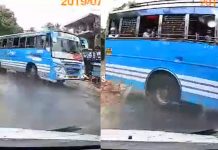Car Passengers attacked in Paliyekkara Toll Booth
Toll tax barriers on highways create massive jams and increase travel time significantly. FASTag technology is a pre paid mode which enable the vehicles to pass through the toll booths without paying cash.The main advantage of FASTag is that it would avoid the long queues of vehicles at the toll plazas.
Time and fuel are saved as the vehicles could pass through the plazas without actually stopping to pay money. Since it is an online transaction, the exchange of currencies could be avoided and there is absolutely no need for the commuters to carry money just to pay at the plazas.
Nowadays Fastag Line seems as closed in Paliyekkara Toll Booth. So many vehicles with Fastag stickers needs to be pay the toll in counter at these moments. Some of the passengers asked about closure of the fastag line and attacked by the toll booth staffs in Paliyekkara. At that time some of the passengers captured the incident in mobile video. Watch the below mentioned video.
The vehicles can pass through the toll plazas about five times quicker than the present situation once the plazas become FASTag enabled. As per the instructions of the NHAI, a vehicle should pass through the toll plaza within 15 seconds. But usually it takes longer than that owing to the non corporation of the customers.
Once the plazas become FASTag enabled, the stipulated time for a vehicle to pass through the plaza will go down to 3 seconds. When a vehicle pass through the toll plaza, the FASTag chip installed in the vehicle would be recognized by the RFID reader using radio frequency and the amount would be paid from the bank accounts of the customers, which actually reduces the work load of both the parties.
The toll collection on the 56-km Edapplly-Mannuthy four-lane highway will cross Rs 1,650 crore at the end of the concession period in 2028 as against the revised total project cost of Rs 721.17 crore. This is as per the information provided by National Highway Authority of India (NHAI) to RTI activist Khalid Mundappilly.
The concession period is for 16 years from 2012 to 2028. They have already completed six years and collected Rs 644.10 crore. In the remaining nine years from January 2019 to June 2028, they will collect another Rs 1006.52 crore taking the total to Rs 1,650 crore.
The yearly increase based on changes in wholesale price index is expected to push the toll collection by another Rs 500 crore taking the total collection to over Rs 2,000 crore.
This calls for a detailed probe into the toll-based highway development and the agreement with Guruvayur Infrastructure Private Ltd (GIPL), says Khalid Mundappilly. The average daily collection in December 2018 was Rs 34.95 lakh. Based on this estimate, the collection in a year will be Rs 125.81 crore.
Mr. Mundappilly has worked out the toll collection in the next nine years without taking into account the revision in the toll-rate based on the wholesale price index and other increases. “If we take such increases into account, another Rs 500 crore will be easily pocketed by the company”, he said. He has also questioned the increase in the total project cost over the years. Initially, the project cost was Rs 312.50 crore which was later revised to Rs 630 crore before moving up further to Rs 721.17 crore.
“There is no transparency in the cost escalation to the tune of Rs 408.67 crore, which is higher than the original project cost. If we add this amount to the overall gain of the concessionaire, the total benefit to the company will be to the tune of Rs 2,500 crore,” he said.



















